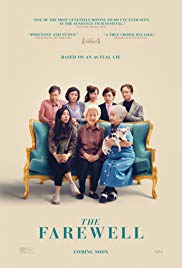
THE FAREWELL
US/ China, 2019, 100 minutes, Colour.
Shuzhen Zhaol, Awkwafina, Tzi Ma, Diana Lin.
Directed by Lulu Yang.
If audiences remember enjoying the film of 1993, The Joy Luck Club, based on the very popular novel by Amy Tan, they will probably enjoy this excursion into the world of the Chinese and the Americans and the 21st-century Chinese-Americans?. However, given the history of China and migration of the 20th century, current interactions are much more light and entertaining.
The tone of the film is set when it is announced at the opening that it is based on “an actual lie�. And the audience is very quickly put in the picture. The focus is on Billi, played with earnestness and good timing by Awkwafina (who featured in Ocean’s Eight and Crazy Rich Asians). She lives in New York City, has ambitions, not quite yet achieved. And she is on the phone constantly with her grandmother, Nai Nai, back in the family home in China.
Billi suddenly discovers from her parents that Nai Nai has had severe diagnoses from the doctors, and a prognosis of a limited amount of time left for her. But, the relatives in China, especially Nai Nai’s sister who cares for her, have decided that they won’t tell her the truth, letting her live out her life with pleasure. But, they do decide to set up an artificial situation, a wedding, as an occasion and justification for all the overseas relatives to come back home.
Nai Nai, Shuzhen Zhao, is a genial though very tough-minded elderly lady – with strong memories of fighting in wars in the past. She is delighted with the arrivals of the family, especially her two sons, Billi’s father and his wife from the US, the other son and his family settled in Japan. And, she decides to take charge of the wedding preparations, not afraid to lay down the law to reluctant chefs.
This means, as in The Joy Luck Club, there are lots of family sequences and a great deal of time spent at the wedding, the speeches, the dancing, the traditional rituals, Billi trying to overcome her sadness and be supportive of her grandmother.
And then, it is time for everyone to leave, tearful farewells, going back home.
There is also a very tongue-in-cheek piece of information at the end of the film, a compounding of “the actual lie�. A film of sentiment and humour. And a reminder of Chinese traditions and the various ways in which they have migrated to other countries, and adapted, especially in the US.
1. A popular film? In Asia? In the US? Beyond?
2. The American settings, New York City, the opening, establishing of Billi and her character and family? The end sequences, Billi after the visit, wondering the New York streets?
3. The Chinese settings, the city, the vistas of the city, the buildings, density population and high buildings, homes, doctors and hospitals, the wedding banquet? The musical score? The American songs, Chinese songs, the final credits and English and Italian?
4. The irony of the title? Nai Nai and her illness, the family not telling her the diagnosis, her prospects for a short life, the word out to all the family, the pretend wedding, everybody turning up?
5. Nai Nai and the phone calls to Billi? The constant contact, family love? Billi and her family, tensions, living alone, not getting the scholarship, her friends, ambitions? Discovering the news about her grandmother? Upset? Deciding to go to the wedding? The arrival in China, the welcomed by her relatives, by Nai Nai? Her keeping silence on the illness?
6. Billi’s parents, the relationship with Nai Nai, the migration to the US 25 years earlier, the bonds and connections? Her father’s brother, his wife, family, life in Japan and achievement? The two brothers being together for the first time in 25 years?
7. The young man, the fiance, the preparations, the planned wedding, the family deception?
8. Nai Nai, her character, strong-minded, the meeting with the old men, the memory of the military days, her sister looking after her (and leaving her husband working in the provinces)? The tests, the diagnoses, the sister keeping the diagnosis?
9. The reaction of the family, in their dealings with Nai Nai, keeping the cover?
10. Nai Nai, the preparation for the wedding, issues of crabs and lobsters, her strong demands?
11. Everybody gathering for the wedding, ceremonies, the banquet, the speeches, including Billi, the son from Japan and his weeping? The
dancing? The devotion to Nai Nai?
12. The news of the diagnosis, Billy running to collect the information, the nurse not being able to read?
13. The farewell, everybody sad, the car to the airport? Billy and her ruminations on the streets of New York?
14. And the final news that Nai Nai lived for another six years!